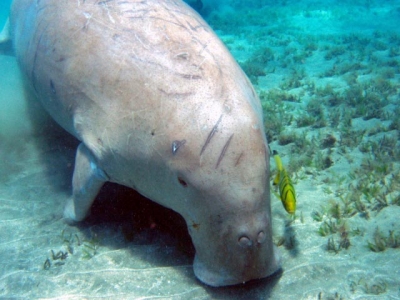
The dugong, commonly known as sea cow, is a marine mammal found in the Gulf of Mannar, Palk Bay, Gulf of Kutch and the Andaman and Nicobar islands in India. In a first for the country, Tamil Nadu will establish a conservation reserve for the animal. Why is such a reserve necessary? Come let’s find out.
Listed as vulnerable” on the IUCN Red List of Threatened Species, the sea cow’s range is spread across 4S countries within the tropical and subtropical coastal and island waters between east Africa and Vanuatu in Oceana”. Largely a herbivore, it feeds primarily on sea grass, and this helps maintain a healthy coastal ecosystem. How? By constantly browsing sea grass, the mammal helps in grass regrowth, ensuring the habitat Bair remains healthy and welcoming of several other marine creatures.
However, dugong populations across the globe have been diminishing due to several reasons such as habitat loss. fatalities caused by gill nets pollution, and illegal hunting Adding to the pressure, they also have a slow rate of reproduction, which could be pushing them further towards extinction. Abundant in Indian waters once, the dugong population is said to be a mere 200 today. And the Tamil Nadu region has a good number of these mammals, which is why the idea of setting up a conservation reserve has come up. The reserve will be established in the Gulf of Mannar and Palk Bay area, spanning 500 sq km.
Did you know?
The dugong and the three species of manatees are related. They also had another cousin called the Steller’s sea cow, now extinct. Said to have been massive at about 30 feet, weighing over 10 tonnes , and larger than many modern whales, it was discovered in 1741 in the sub-Arctic waters by German biologist Georg Wilhelm Steller’s after whom it was named. “Within just 27 years of being formally described, humans had completely eradicated a marine mammal” – hunted to extinction for fur.
Picture Credit : Google




